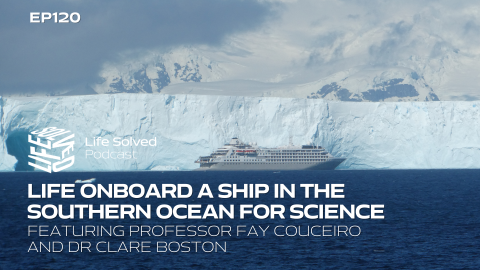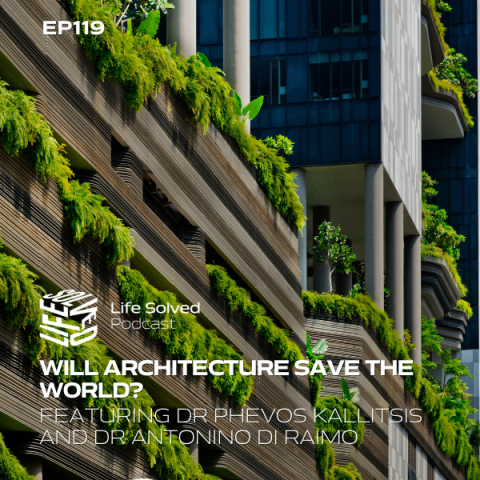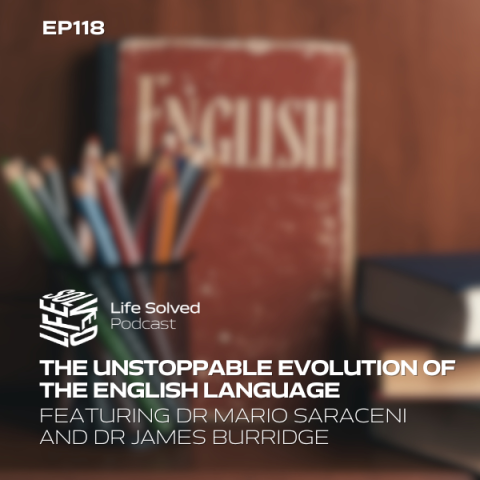

In this episode we chat to two researchers who travelled to one of the most remote inhospitable regions on the planet, in the pursuit of science.
20 min listen
Life onboard a ship in the Southern Ocean for science
In this episode we chat to two researchers who travelled to one of the most remote inhospitable regions on the planet, in the pursuit of science.
Professor Fay Couceiro and Dr Clare Boston from the University of Portsmouth travelled 7,000 nautical miles onboard a Royal Navy ship during its annual trip to the frozen continent of Antarctica. We find out why they were there, what they saw, and what life at sea is really like.
We’d love you to be part of the discussion, too. Email your questions on this episode or ideas for future episodes to lifesolved@port.ac.uk.
If you’ve been inspired by this episode, and want to support our research then head to port.ac.uk/lifesolved to find out how. You can also find out how to work or study with us.
Life Solved is released on Thursdays and available on all major podcast platforms.
Antarctica tales with Professor Fay Couceiro
A trip of a lifetime for Professor Fay Couceiro after she was invited to study pollution levels in Antarctica and how human activity has had an impact on the local environment. Fay was one of 12 researchers, and one of two from the University of Portsmouth, invited by the Royal Navy on board HMS Protector in December 2023.
Professor Fay Couceiro Travels to Antarctica
Professor Fay Couceiro [00:00:01] I love playing with all the equipment in the lab, but I really like getting outside and Environmental Pollution allowed me to do both. It allowed me to get out into the environment, to keep those areas that I enjoy using, rivers and the sea, clean, and I've always wanted to do polar work, but all my work so far has been temperate or tropical. And so when I had the opportunity to go to Antarctica and look at pollution levels, I jumped at it.
On screen text - In December 2023, Fay was invited by the Royal Navy to sail to Antarctica on board the HMS Protector as one of 12 researchers.
Professor Fay Couceiro [00:00:23] The first iceberg we saw was actually on quite a grey day. It was really far away, and all the people who were new to Antarctica were so excited. We all took 100 photos of the same iceberg getting slowly, slowly closer. And all the people who had been before just kept saying, "just wait". And as we then moved along and the days progressed, we just saw the more and more spectacular icebergs and of course the weather cleared up and they were beautiful colours as well. We were going through Lemaire channel, which is sometimes known as Kodak Valley because everyone takes so many pictures. And then we had humpback whales feeding right next to the ship as we went through the channel. And just... It was so peaceful. Everybody on the ship who wasn't working was outside watching it, and we were all silent because we were all awestruck. It was really quite a special moment.
On screen text – Despite being one of the most remote places in the world, over 100,000 people visited Antarctica in 2023.
Professor Fay Couceiro [00:01:19] The cruise ship industry has really taken off going towards Antarctica. So what I wanted to do was check what that meant for the water quality in the areas where there are regular visitors. And I looked for heavy metals, microplastics and antimicrobial resistance genes. These are all different ways that humans can impact the local environment. The next step is to actually analyse those samples. It's going to be at least six months or possibly longer before all of the analysis is finished. That data will then be shared both with the general public, the Navy, and also IAATO the International Association of Antarctic Tour Operators. Each of those people have a say in who can go to Antarctica and what policies they must follow whilst they're there. They can make the decisions about whether the number of cruise liners going is fine, whether they should decrease it, but also if there are any improvements that can be made to those ships. Small differences about how the water is released from those ships could make a big difference to the quality of the water in Antarctica.
On screen text – This Earth Day 2024, earthday.org is demanding a 60% reduction in the production of all plastics by 2040.
Professor Fay Couceiro [00:02:29] I guess what I want people to think about with microplastics is that they are reaching these areas that we have considered pristine, they have been found at the top of Everest and they have been found in Antarctica. So things that we are doing here in our homes are reaching all the way to the other side of the planet. Where possible, I think it's important for people to think about the impacts and to see what we can do to reduce the amount of plastic that we use as a whole, which will ultimately reduce the amount of microplastics produced.
Previous episodes...
In the last series of the Life Solved podcast we discuss the History of the Horror Genre, the reality of radiation and address Fukushima fake news, are UFOs real, Incels and TikTok, how cravings affect our senses, and when will the cost of living crisis end?
Will architecture save the world?
24 April 2024
18 min listen

The unstoppable evolution of the English language
18 April 2024
25 min listen

